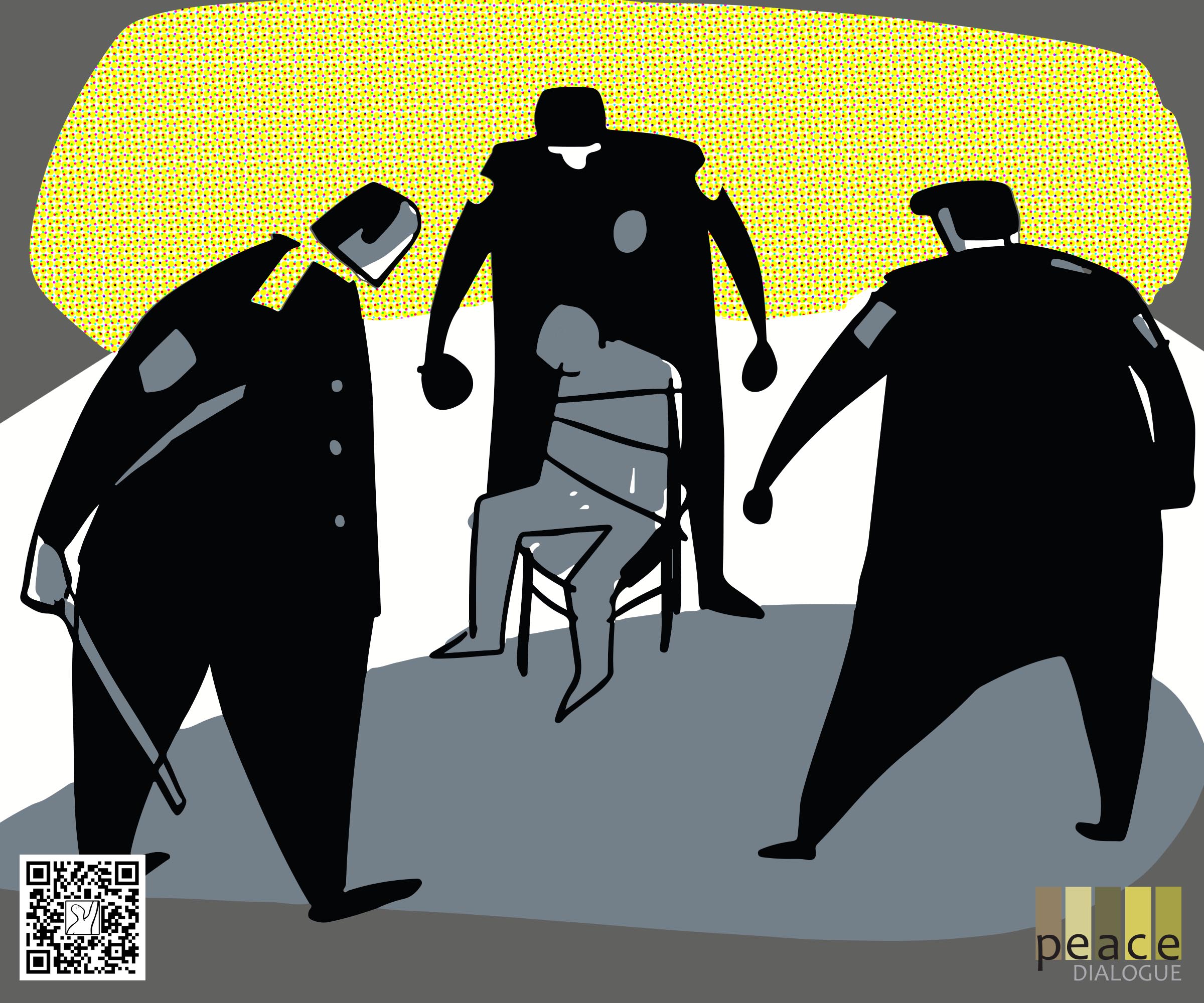
© 2019. ILLUSTRATION BY ALEXEY IORSH, MOSCOW, RUSSIAN FEDERATION
Issues related to human rights protection in the Armed Forces (AF) have always been a specific focus of watchdog groups. In recent years, NGOs in this field have often reported that human rights and fundamental freedoms, as outlined in both international and domestic legal acts, have been grossly violated in the army. Peace Dialogue NGO’s longstanding experience in the human rights advocacy field shows that servicemen and civilians detained in Military Police (MP) solitary confinement cells are more vulnerable in terms of legal protection: particularly in the context of ensuring the right to freedom from torture.
Since 2012, Peace Dialogue NGO (PD) has provided legal assistance during pre-trial and trial stages to a number of families of servicemen killed in the AF in non-combat situations. It has also provided representation and advocacy to citizens in criminal proceedings on human rights violations recorded in the army. As with aforementioned criminal cases, the organization noted that criminal prosecution authorities often failed to ensure one of the most important criteria for effective investigations: witnesses in the case and other trial participants were subjected to cruel, inhuman or degrading treatment.
Torture, inhumane or degrading treatment of persons brought before the MP as suspects or witnesses during criminal proceedings has been used to extort confessions or put pressure on servicemen when making statements in order to obtain desired information or testimonies. These persons were subjected to physical and mental pain. Issues related to the individual cases of torture of servicemen by RA MP officials were also raised in reports compiled by the RA Human Rights Defender (Ombudsman).
Experience shows that criminal cases involving torture only rarely reach the courts. This is also due to the difficulty (or nearly impossibility) of providing proof. In many cases, due to mistrust of judiciary institutions, citizens prefer to remain silent about torture cases. The accused believe that raising such issues may worsen their situation. Moreover, vicious practices show that they are the ones who have to prove that they have been subjected to torture. It is sufficient to note that no official in Armenia has yet been held responsible for ill-treatment and torture of another person: even in cases where torture and ill-treatment was recognized by the European Court of Human Rights (ECtHR). As of January 2020, only one case of a violation of a citizen’s right to freedom from torture had been registered by an RA court. On 8 January 2019, the RA Court of Appeals made an unprecedented ruling recognizing the violation of Arthur Hakobyan’s right to freedom from torture. He had been dismissed from the army in 2015 on grounds of mental illness. Despite the Court’s decision, so far, no defendant has been called in the case.
The problem is further complicated by the fact that low levels of public awareness have not created intolerance towards acts of torture, ill- or degrading treatment by the general public (both in official circles and among citizens). People find these phenomena quite understandable or somewhat acceptable. They have a tolerant attitude towards them.
As early as in 2015, the RA Government acknowledged that the current Law on Military Police did not stipulate MP functions/roles in such penal institutions as disciplinary battalions, disciplinary garrisons and solitary confinement cells. Despite the fact that a Law on Making Additions and Amendments to the RA Law on Military Police (adopted in 2017) had attempted to bring some clarity to MP functions as concerns solitary confinement, a new law regulating the field has not been adopted. As a result, there is still uncertainty about the MP’s role and its nature.
In addition to the lack of clear legislative regulation, the sector’s reform has also been hampered by the system being closed. As a structure of the Ministry of Defense, the MP is not subject to public scrutiny. PD is aware of cases where lawyers were not able to access the MP Department to protect a citizen’s interests in a criminal case. Moreover, the Ombudsman’s staff was once even denied access to the MP Department by Military Police officers.
In January 2019, PD started implementing the project “Ensuring the right to freedom from torture for persons involved in criminal proceedings on incidents recorded in the AF.” The project aims at preventing torture, inhuman or degrading treatment towards persons involved in criminal proceedings at MP Departments of the Republic of Armenia AF.
In order to achieve the stated goal, PD sought to identify gaps in existing domestic legislation regulating the field in terms of protecting citizens from torture. It also looked to identify these legal acts’ inconsistencies with international documents ratified by the Republic of Armenia and recommendations submitted by international organizations. In addition, based on analysis of cases known to PD that involve torture of persons in criminal proceedings at MP Departments of the Republic of Armenia AF, the project attempted to identify existing problems, their causes, provide suggestions for possible solutions and present them to responsible persons in the field.
This report has been developed due to actions carried out as part of this project. The goal is to raise public awareness of the topic and to promote positive changes in law enforcement practice.
You can download the full report in English under the link below. Ensuring the right to freedom from torture for persons brought before the Military Police as suspects and witnesses in criminal proceedings on incidents recorded in the Armenian Armed Forces (PDF, 2 Mb).
The project is implemented with the grant provided within scope of the Program “A Positive Change through Civil Society Empowerment”.
The program “A Positive Change through Civil Society Empowerment”is financed by OSF Armenia in cooperation with Public Policy Institute and the Union of Informed Citizens.
![]()
![]()
![]()
![]()




